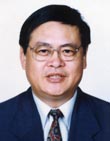Dean of Peking University to give Oct. 28 lecture on China-U.S. relations
By Franklin Crawford

In the terpsichorean show of international politics, no two dance partners could be more unsure of one another than the United States and China. Yet the fortunes and interests of both countries are inextricably intertwined. With flash points such as international terrorism, Taiwan, North Korea and Japan, the diplomatic trick is to avoid stepping on toes and undermining a relationship of mutual benefit.
What's missing in the United States is the Chinese perspective on this relationship. Few people are better positioned to offer that than Wang Jisi, dean of the School of International Studies at Peking University. Wang will be at Cornell University to deliver a lecture, "China's Rise vs. America's Supremacy: Conflict or Cooperation?" Friday, Oct. 28, from 3 to 5 p.m. in Hollis E. Cornell Auditorium in Goldwin Smith Hall on campus. The lecture is free and open to the public.
The United States is currently the only country with the capacity and the ambition to exercise global primacy, and it will remain so for a long time to come, according to Chen Jian, Cornell's Michael J. Zak Chair of History for U.S.-China Relations. Chen is the host for the visit and a key figure in the newly launched China and Asia-Pacific Studies (CAPS) program. Peking University has partnered with Cornell to teach CAPS majors for a semester in Beijing.
"China is the most populous and most rapidly developing country in the world," Wang noted in a recent article in Foreign Affairs. "Although in recent years Beijing has refrained from identifying Washington as an adversary or criticizing its 'hegemonism,' many Chinese still view the United States as a major threat to their nation's security and domestic stability."
Yet, Wang stated in the article, "the United States is a global leader in economics, education, culture, technology and science. China must maintain a close relationship with the United States if its modernization efforts are to succeed. A cooperative partnership with Washington is of primary importance to Beijing, where economic prosperity and social stability are now top concerns. The United States also needs China's help on such issues as counterterrorism, nonproliferation, the reconstruction of Iraq and the maintenance of stability in the Middle East."
The lecture is hosted by the College of Arts and Sciences and the CAPS program. Co-sponsors include Cornell's East Asia Program, and the Departments of Government and History. For more information, contact Jennifer Evangelista at (607) 255-2654 or e-mail jld21@cornell.edu.
Media Contact
Get Cornell news delivered right to your inbox.
Subscribe